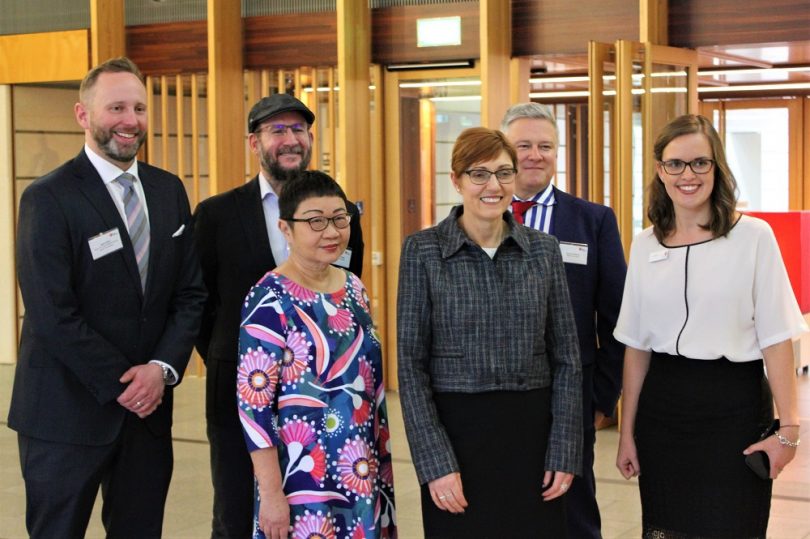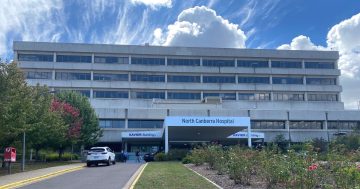
Back row, from left: Mark North, chair of the ACT Heart Foundation Local Advisory Board; Kieran Phillips, The Heart Foundation; and Duncan Bremner, The Heart Foundation. Front row, from left: Alice Tay, National Heart Foundation Board Member; ACT Minister for Health Rachel Stephen-Smith; and Meg Ryan, The Heart Foundation. Photo: The Heart Foundation.
Every year in the ACT, around 500 of 6000 patients who are hospitalised with a cardiovascular disease will not return home to their loved ones.
It’s a shocking statistic, and one The Heart Foundation and top local researchers and professionals working in the field are working to change.
The recent seminar, “Saving Australian Hearts: The Journey So Far and What is Next”, at the National Portrait Gallery, was was touted as an opportunity for Canberra’s cardiovascular research community of academics and health professionals to reconnect face-to-face for the first time since the start of the COVID-19 pandemic.
In attendance was ACT Minister for Health Rachel Stephen-Smith, leading researchers from the Australian National University and University of Canberra, as well as several cardiologists, cardiac nurses, pharmacists, policy makers, businesspeople and heart disease survivors.
The clinical director of Canberra Health Services and professor of cardiovascular medicine at ANU, Professor Walter Abhayaratna, delivered a speech that detailed some of the current challenges in health care for people with heart disease.
“Treatments for heart disease are improving, and high-quality research is undoubtedly the reason for the progress we have made,” he said.
Yet, Professor Abhayaratna still wants to see outcomes improve, and the numbers of inpatients and deaths go down.
“We still need to see a stronger focus on patient-centred care, where we are truly putting the needs of the patient at the heart of the health system,” he said.
“This means working together across all areas of the health system, building the connections between acute hospital staff through to better community care. This will ensure people avoid unnecessary admissions and also get home sooner to recover with the right supports,” he explained.
Professor of epidemiology and public health at ANU, Professor Emily Banks, added to Professor Abhayaratna’s point and reiterated that coronary heart disease remains the biggest killer “largely because we are not implementing what we know to prevent it.”
“We need to go harder against smoking – especially in priority groups – and make sure people are getting Heart Health Checks to see if they are at risk,” said Professor Banks.
“If someone is at risk, they need to continue with blood pressure and cholesterol-lowering medications.
“It’s that simple, and research needs to focus on how to effectively implement what we know, in the clinic and community.
“It’s harder than a heart transplant – we haven’t cracked it yet.”
The seminar also provided an opportunity for The Heart Foundation to provide an overview of its work nationally and in the ACT, including its research program.
The Heart Foundation’s senior coordinator, support and care, Meg Ryan, said that as Australia’s biggest non-government funder of world-class cardiovascular research, The Heart Foundation has invested more than $670 million into research during the past 60 years.
“Here in the ACT, we have many innovative researchers and exceptional health professionals,” she said. “It was terrific to be able to meet face-to-face with them for the first time in 18 months, and to hear the latest updates on their important work.
“The Heart Foundation is committed to lessening the impact of heart disease on the community, and we take pride in working alongside these local experts to make this mission a reality. We will continue to foster relationships within this network, and to celebrate their expertise and passion.”
For more information, visit The Heart Foundation.














